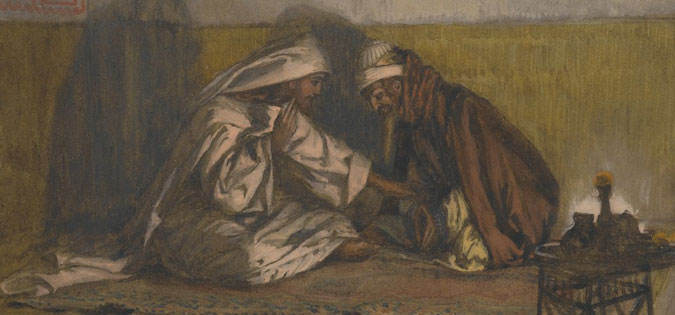 Each week of Lent, we’ll provide an Ignatian prayer for you, inspired by a video from Arts & Faith: Lent. The video and prayer for the Fourth Week of Lent, Cycle B, are based on John 3:14–21. The art is James Tissot’s “Interview between Jesus and Nicodemus.”
Each week of Lent, we’ll provide an Ignatian prayer for you, inspired by a video from Arts & Faith: Lent. The video and prayer for the Fourth Week of Lent, Cycle B, are based on John 3:14–21. The art is James Tissot’s “Interview between Jesus and Nicodemus.”
Jesus said to Nicodemus:
“And this is the judgment, that the light has come into the world, and people loved darkness rather than light…For all who do evil hate the light…But those who do what is true come to the light.”
—John 3:19–21
Preparation
The union in openness of body and mind and heart that is prayer begins with attention to each.
First your body: Sit upright, legs crossed or not, feet on the floor or not, lower back pressed against the chair. Or not. Breathe.
Now the mind: As you are able, let these words spill through the mind and down your spine into the earth. Let your thoughts puff away with each breath. As new ones come—knotted as they are with joy or pain—hold them like wounded birds. Set them aside to heal. Breathe.
And the heart: Vulnerability means able to be wounded. Of course there is resistance. Notice it. With your breath and with energy, pull back the vines and push open the gates. Breathe.
Tilt your chin up to the heavens and, with eyes open or closed, look back at the One who gazes at you with great affection.
Breathe.
Demanding Depth
Nicodemus is an influential man, a ruler amongst his people. He has something to lose by coming to Jesus, the man who overturned the tables in the Temple, a man who brings miracles and causes conflict wherever he goes. Not yet ready to risk coming to see Jesus in the light of day, Nicodemus instead comes at night.
- What is it that makes Nicodemus take the risk of coming to see Jesus?
- Have you been fascinated by someone, drawn to them despite consequences?
- How do you imagine Nicodemus feels as he walks familiar roads in darkness on his way to Jesus’ house? Is he nervous or excited?
- How does the night air feel to him? Can he see the stars? Does it take courage to announce his presence as he arrives at Jesus’ home?
- How does he feel as he walks into the room? Is he expected? Welcomed?
- What is Jesus like as he slips off his sandals and steps forward on the mat?
Having begun the conversation with Jesus by proclaiming what he knows of him—that he is “a teacher who has come from God”—the last words we hear Nicodemus speak take the form of a quiet question: “How can this be?”
- Alone in the lamplight, seated next to him, what questions would you like to ask Jesus?
- Does he listen to your questions? Does he hear?
- In words or gestures, in imaginations or memories that bubble up within you, in feelings that stir in your heart—in any of these ways—does he respond?
- Does he reach out to take your hands? Is there an image that arises in response to your question? In a moment of quiet, trust the response that comes.
The Jesus we come to know in John’s Gospel is unsatisfied with shallow relationships. He demands depth from us would-be disciples. It’s this desire for depth and this endless desire of the Lord for friendship with us that lead him to speak so clearly of light and dark and of judgment in the words of Scripture we hear today.
- How does Nicodemus respond as Jesus asks for more from him? How do his whispered responses sound?
- Is he grateful for such an invitation? Excited that the one with whom he is fascinated desires depth of friendship with him?
- Or is it fear that leaks from Nicodemus into the shadowed room? Coming to the light will have consequences, and he is a man with responsibilities. Is Nicodemus afraid of what will happen, what will be asked of him, if he accepts this invitation to love?
- What of you? What stirs inside you as you speak with this Jesus who is unsatisfied with simply being an acquaintance? How do you react to his relentless love?
Speak with him. Speak with him about any hesitations, any joys you feel. Speak with honesty about what has happened in your prayer. You were invited into his home during the night, so speak with him as close friends do in the darkness.
Concluding Prayer
Glory be to the Father,
and to the Son,
and to the Holy Spirit.
As it was in the beginning,
is now, and ever shall be,
world without end.
Amen.
If your parish is celebrating the RCIA scrutinies, see the video and reflection for Cycle A here.

These reflections of Arts and Faith get to the very core of me. A journey of blessings throughout this Lenten season
Thank You
God Bless